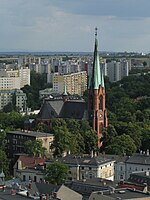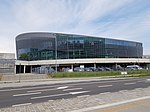Gliwice (Polish: [ɡliˈvit͡sɛ] ; German: Gleiwitz, pronounced [ˈɡlaɪvɪts] ; Silesian: Gliwicy) is a city in Upper Silesia, in southern Poland. The city is located in the Silesian Highlands, on the Kłodnica river (a tributary of the Oder). It lies approximately 25 km west from Katowice, the regional capital of the Silesian Voivodeship.
Gliwice is the westernmost city of the Upper Silesian metropolis, a conurbation of 2.0 million people, and is the third-largest city of this area, with 175,102 permanent residents as of 2021. It also lies within the larger Upper Silesian metropolitan area which has a population of about 5.3 million people and spans across most of eastern Upper Silesia, western Lesser Poland and the Moravian-Silesian Region in the Czech Republic. Gliwice is bordered by three other cities and towns of the metropolitan area: Zabrze, Knurów and Pyskowice. It is one of the major college towns in Poland, thanks to the Silesian University of Technology, which was founded in 1945 by academics of Lwów University of Technology. Over 20,000 people study in Gliwice. Gliwice is an important industrial center of Poland. Following an economic transformation in the 1990s, Gliwice shifted from steelworks and coal mining to automotive and machine industry.
Founded in the 13th century, Gliwice is one of the oldest settlements in Upper Silesia, with a preserved Old Town core. Gliwice's most historical structures include St Bartholomew's Church (15th century), Gliwice Castle and city walls (14th century), Armenian Church (originally a hospital, 15th century) and All Saints Old Town Church (15th century). Gliwice is also known for its Radio Tower, where Gleiwitz incident happened shortly before the outbreak of World War II and which is thought to be the world's tallest wooden construction, as well as Weichmann Textile House, one of the first buildings designed by world-renowned architect Erich Mendelsohn. Gliwice hosted the Junior Eurovision Song Contest 2019 which took place on 24 November 2019.











